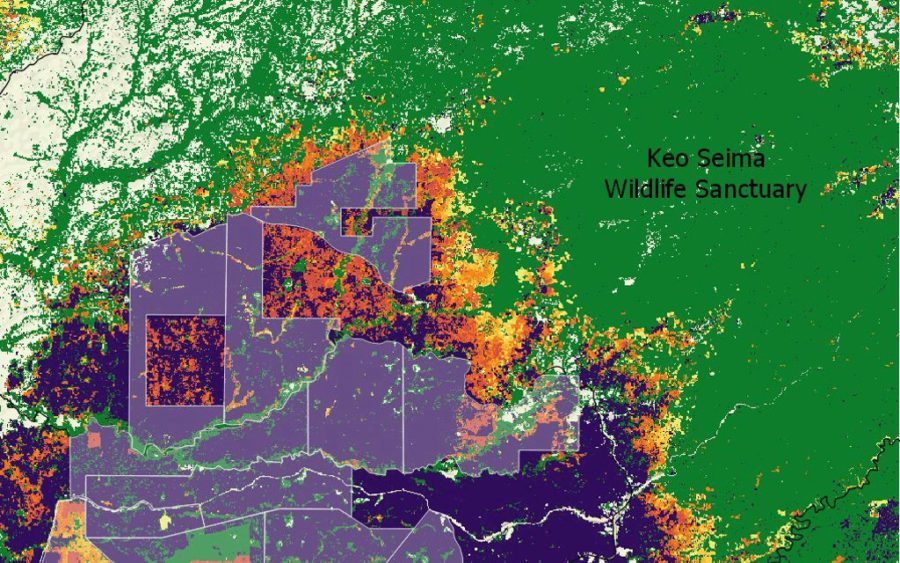Illegally felled timber is still flowing through provinces despite travel bans and increased scrutiny of traffic due to the Covid-19 outbreak, activists alleged, raising suspicions of officials’ involvement in the trade.
Meanwhile, the Mondulkiri provincial environmental department handed nearly 40 hectares of the Keo Seima Wildlife Sanctuary to a police officer, who allegedly then also fenced off 12 hectares of local communal forest land, sparking accusations of state-sanctioned encroachment.
In a directive dated April 6, the government banned travel between provinces for two weeks to try to curb a surge of Covid-19 cases, particularly ahead of the Khmer New Year when Cambodians traditionally return to their home provinces.
Checkpoints have been set up along major roads in and out of provinces, with travel permitted only for work, goods transport and other exceptions. Authorities are also keeping closer watch on new arrivals to villages throughout provinces.
But the scrutiny has not extended to motorbikes, trailers and other vehicles hauling timber that still pass along various roads, said So Khorn, representative of the Prey Lang Community Network in Kratie province.
“Vehicles and motorcycles can transport timber day and night without seeing any ban from authorities. But if ordinary people go by here and there, they inspect very strictly. If people from Phnom Penh enter a village, they are not allowed to enter, but wood can be transported out,” Khorn said.
The network’s Kampong Thom representative Sok Plork said many ordinary people were facing restrictions, but he had seen timber transport continue unabated. “There is no decrease. It is transported every day, transported normally,” Plork said.
Preah Vihear representative Srey Thei said he saw three to four vans full of timber driving through his local area every day, and alleged officials’ involvement. “I haven’t seen any officials ban anything,” Thei said.
Mondulkiri provincial administration director Neang Vannak said authorities have taken strict measures against the transport of timber, but they simply could not prevent all of it.
“We, the provincial authorities, do not allow the transportation of timber to this province or that province, and today, our provincial authorities are working hard on this, and are continuing like rain showers,” he said.
“But as you know, the case of transporting timber or forest crimes is today done secretly, so the secret [work] is very difficult to prevent 100 percent,” Vannak said.
Environment Ministry spokesman Neth Pheaktra could not be reached for comment, but has said in the past that existing timber trafficking was only small-scale.
Satellite data has shown an increase in illegal logging of protected areas.
Meanwhile, in Mondulkiri, provincial environment director Keo Sopheak said about 40 hectares of Keo Seima Wildlife Sanctuary had been given to Thaing Rithy, a police officer, as he had been occupying the protected area for many years and it was not densely forested.
“We’ve seen in reality that they’ve relied on [the land] for years because the land is not forest land, with [only] some forest, [and] some cashew plantations. And the cashew trees are four to 19 years old and we saw that,” Sopheak said.
If the land was forest, the department would have confiscated it and returned it to a protected area, he said. But “we don’t just take it away unless it is forest land.”
Mondulkiri Indigenous Community Network adviser Kroeung Tola disputed that the land was not part of the forest. Authorities should be taking legal action against the officer who encroached on the protected area, but instead they were likely involved, he said.
“Without local officials signing or approving, no one will take it. It is the system,” Tola said. “What the government should do is to work to get rid of all of that systematic group. There should be administrative measures to remove them from positions, suspend and punish them according to the law.”
“The government should not allow such people to continue, because by keeping them, things will become anarchy, the problems in society will be endless,” he said.
Andong Kraloeng village chief Sokha Thot added that Rithy, the officer, had cleared and fenced off 12 hectares of community forest land in addition to the 39 hectares of wildlife sanctuary.
“We will protest if he does not withdraw and return the community land to us. We will file a complaint to the Ministry of Interior,” he said, adding that local authorities had ignored their complaints.
Rithy could not be reached for comment.













